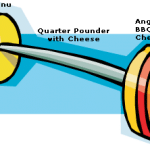I’m one of those folks who avoids brick-and-mortar shopping like the plague during the holiday season. If I can’t get it via the Internet or even an old-school catalog, forget it.
You can imagine the piles of catalogs that our unlucky postal carrier drops at our house most days in November and December. All filled with glowing descriptions of gourmet-priced products, which no doubt warm a copywriter’s heart. Now, I like to send food gifts. They don’t accumulate like so much STUFF, and everyone enjoys a treat, especially if it’s not something they can get every day.
But ordering food items from a website also seems risky to me. IS it really delicious? Says who? You or the customers? Is it even fresh? The last thing I want to do is send some run-of-the-mill gift basket that’s been sitting around since last year, full of stale, cheap ingredients, delivered late THIS year. And if you can’t even say whether your product contains nuts, or coffee, or anything else the recipients might be allergic to or Just Not Like, why should I order from you?
I get more than a little jumpy when I see no customer descriptions of:
1) Delicious, tasty products
2) Speedy delivery
3) Truly friendly customer service
4) Quick resolution when something goes wrong
5) Repeat business
Also missing in action:
1) How they make sure products taste great, arrive on time, etc.
2) A little personal info about long-term employees and their importance
3) The company’s good works in the community
It seems so basic. Tell me you have at least SOME happy customers and let me hear from them. At least tell me how you would MAKE them happy. Anything that helps me feel like I “know you” is good.
The one exception I’ve spotted so far is an outfit called Sunnyland Farms in Georgia. They sell nut products. Some of my gift recipients don’t like nuts. Go figure. But they’re the first place that pops to mind when I think about making a gift of food to someone. I’m absolutely convinced that they have great products and great service.
Here’s why:
1) Their copy feels personal. I read it just because it’s such a “feel good” experience.
2) Enough personal information about the folks running the business that you feel like these are folks you’d go out of your way to do business with (by the way, that’s our definition of a loyal customer).
3) Pictures of employees who have been with them for years.
4) A clear message that quality matters — not just lip service
5) Product descriptions that really help you picture what the item would be like.
6) Glowing and sincere testimonials from customers on practically every page.
I’ve been noticing how many wellness-related firms miss these same basics. A yoga studio near my home proudly lists all their services in a brochure they’ve been distributing everywhere over the last couple of weeks. The first black mark: it’s loaded with terms most consumers wouldn’t recognize (energy training and brain respiration, among others). Also missing: quotes from happy customers, ANY info about instructors, and meaningful descriptions of what happens in class.
It’s like a club you can’t join because you don’t know the password. Exclusiveness is fine, but this pitch plays to insiders in the extreme.
Instead, use plain, clear language in your marketing materials, stuff your grandmother would understand. Reassure potential customers they’ll feel safe and secure among qualified experts. Tell them what class is like, step by step. Let other customers do a good bit of the explaining through testimonials.
The new yoga studio’s probably a great place. But I bet they are wondering why their brochure didn’t win them more clients.




